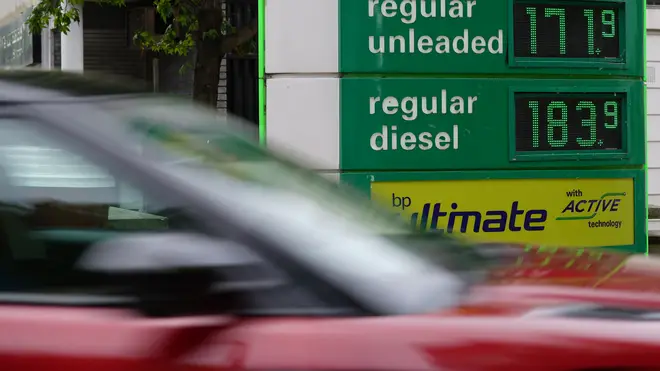
Ben Kentish 10pm - 1am
24 June 2022, 12:54

The Office for National Statistics (ONS) reported an increase in the number of households highlighting a rise in their cost of living.
Around 45% of Britons said they have cut back on car journeys over the past fortnight after seeing a surge in fuel prices, according to new figures.
The Office for National Statistics (ONS) reported an increase in the number of households highlighting a rise in their cost of living in its fortnightly survey of households.
It said 91% of Britons saw a rise in the overall cost of living over the period to June 19 as food, energy and fuel all weighed on shoppers.
This represented an increase from 88% in the survey from two weeks earlier as inflation continued to rise.
The survey reported that 93% of households said a rise in grocery bills contributed to the higher cost of living.
46% of adults said they were spending more to get what they usually buy when food shopping in the past two weeks 🛒
This compares with 18% when we first asked about this in Oct 2021. pic.twitter.com/RvdjeAlOdW
— Office for National Statistics (ONS) (@ONS) June 24, 2022
The increased cost of energy was highlighted by 86% of people, while 80% blamed increased spending on fuel.
A fifth of people, 20%, said they were most worried about the higher cost of fuel, jumping from 15% in the previous period.
Concerns over rising petrol and diesel prices caused 45% of households to admit to cutting back nonessential travel in cars and other vehicles, rising from 40% in the previous period.
It comes after figures from data firm Experian showed the average price of a litre of diesel at UK forecourts reached a new high of 197.1p earlier this week.
The average price of petrol was a record 189.3p per litre.
A year ago, the prices were 133.5p for diesel and 131.1p for petrol.
Downing Street declined to say whether the 5p fuel duty cut is sufficient to help households struggling with rising prices, pointing instead to a wider Government support package.
A No 10 spokesman said: “We know that many people are facing cost-of-living pressures up and down the country and we acknowledge that the price of petrol is one of those pressures.
“That’s why we introduced the 5p reduction in terms of duty, but it’s also worth remembering the wider package of support that the Chancellor has announced that will mean that 30% of households in the UK, so approximately eight million, will receive £1,200 in extra support to help them through this difficult period.”
The survey also showed that almost half of consumers had to spend more than usual to buy their normal shopping.
The ONS revealed that 46% of adults said they had seen the cost of shopping increase above usual over the past two weeks, representing a sharp jump in the cost of living after only 18% of shoppers reported increased spending when asked last October.
It comes hours after the body revealed that UK retail sales had dipped as people reined in their spending.